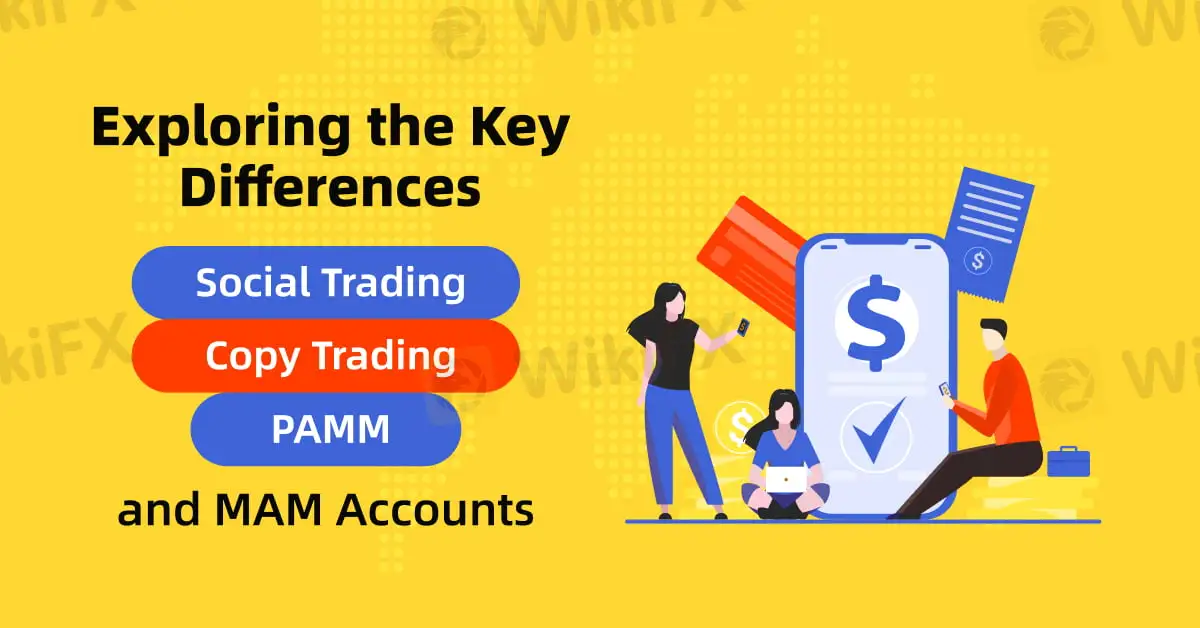简体中文
繁體中文
English
Pусский
日本語
ภาษาไทย
Tiếng Việt
Bahasa Indonesia
Español
हिन्दी
Filippiiniläinen
Français
Deutsch
Português
Türkçe
한국어
العربية
Exploring the Key Differences: Social Trading, Copy Trading, PAMM, and MAM Accounts
Abstract:In the world of online trading, various account types and trading models allow investors to participate in the market with varying levels of involvement. Among the most popular are social trading, copy trading, PAMM (Percentage Allocation Management Module), and MAM (Multi-Account Manager) accounts.

In the world of online trading, various account types and trading models allow investors to participate in the market with varying levels of involvement. Among the most popular are social trading, copy trading, PAMM (Percentage Allocation Management Module), and MAM (Multi-Account Manager) accounts. While each of these methods has its own advantages, understanding their differences is crucial for selecting the one that best aligns with an investor's goals and risk tolerance.

Social trading is a relatively new concept that allows traders to observe the strategies and trading behaviours of others within a community. Platforms that offer social trading often feature live feeds where users can view, comment on, and discuss trades made by others. This model promotes transparency, enabling traders to learn from others by following more experienced investors. While its a great tool for beginners to learn, social trading is not necessarily automated. Participants still need to manually replicate trades they like unless the platform also incorporates copy trading functionality. The focus here is on fostering a community-driven environment where information and strategies are shared.

Copy trading takes the concept of social trading one step further by automating the process. Instead of manually placing trades based on observations, investors can directly copy the trades of experienced traders. The investors account mirrors the trades of the selected trader in real time, automatically replicating the trades at the same proportion. This model appeals to individuals who prefer a hands-off approach, as it requires minimal involvement once set up. However, risks are inherent in copy trading as the investor is completely reliant on the chosen trader's decisions. Platforms offering copy trading usually allow investors to choose traders based on risk profiles, past performance, and strategies.

PAMM accounts function similarly to managed funds. In this model, investors allocate their funds to a professional trader or money manager, who then manages these pooled investments. The distinguishing feature of PAMM is that the manager‘s own capital is also part of the fund, aligning the manager’s interest with the investors. Profits and losses are distributed among investors based on their percentage of the total pool. Unlike copy trading, PAMM account investors do not choose specific trades to follow; instead, they trust the manager to make all decisions on their behalf. PAMM accounts offer an efficient way to outsource trading but require trust in the managers expertise.

MAM accounts are an extension of PAMM, offering more flexibility to both managers and investors. In a MAM account, the manager has the ability to allocate trades in different proportions to various client accounts, allowing for a more customized trading approach. For instance, clients with higher risk tolerance can take on more exposure to certain trades than those with a conservative profile. MAM accounts are ideal for professional traders managing multiple clients with differing needs. The added flexibility of MAM accounts makes them popular among hedge funds and institutional traders.
In summary, choosing between social trading, copy trading, PAMM, and MAM accounts depends on an investors objectives and risk appetite. Each method has its own merits, and understanding these differences can help investors make informed decisions when navigating the financial markets.

Disclaimer:
The views in this article only represent the author's personal views, and do not constitute investment advice on this platform. This platform does not guarantee the accuracy, completeness and timeliness of the information in the article, and will not be liable for any loss caused by the use of or reliance on the information in the article.
Read more

Italian Regulator Warns Against 5 Websites
The Italian regulator, CONSOB has issued a warning against five websites offering unauthorized financial services. This regulatory action aims to protect the public from fraudulent activities.

Trader Exposes Unethical Practices by STP Trading
A recent allegation against STP Trading has cast doubt on the firm's business practices, highlighting the potential risks faced by retail traders in an increasingly crowded and competitive market.

What Makes Cross-Border Payments Easier Than Ever?
Cross-border payments are now faster, cheaper, and simpler! Explore fintech, blockchain, and smart solutions to overcome costs, delays, and global payment hurdles.

FCA Identifies Clone Firm Exploiting Admiral Markets' Credibility
The UK Financial Conduct Authority (FCA) has issued a public warning regarding a fraudulent entity impersonating Admiral Markets, a legitimate and authorised trading firm. The clone firm, operating under the name Admiral EU Brokers and the domain Admiraleubrokerz.com, has been falsely presenting itself as an FCA-authorised business.
WikiFX Broker
Latest News
Hackers Charged for $11M Crypto Theft Using SIM-Swaps
Role of Central Banks in the FX Market
FCA Alerts Against Sydney FX
What Makes Cross-Border Payments Easier Than Ever?
Trader Exposes Unethical Practices by STP Trading
Bitcoin Nears $100,000: A Triumph of Optimism or a Warning Sign?
Malaysian Man Loses RM113,000 in Foreign Currency Investment Scam
Mastercard Partners with JPMorgan for B2B Cross-Border Payments
FCA Identifies Clone Firm Exploiting Admiral Markets' Credibility
Coinbase Under Scrutiny Amid Wrapped Bitcoin Delisting Controversy
Currency Calculator


